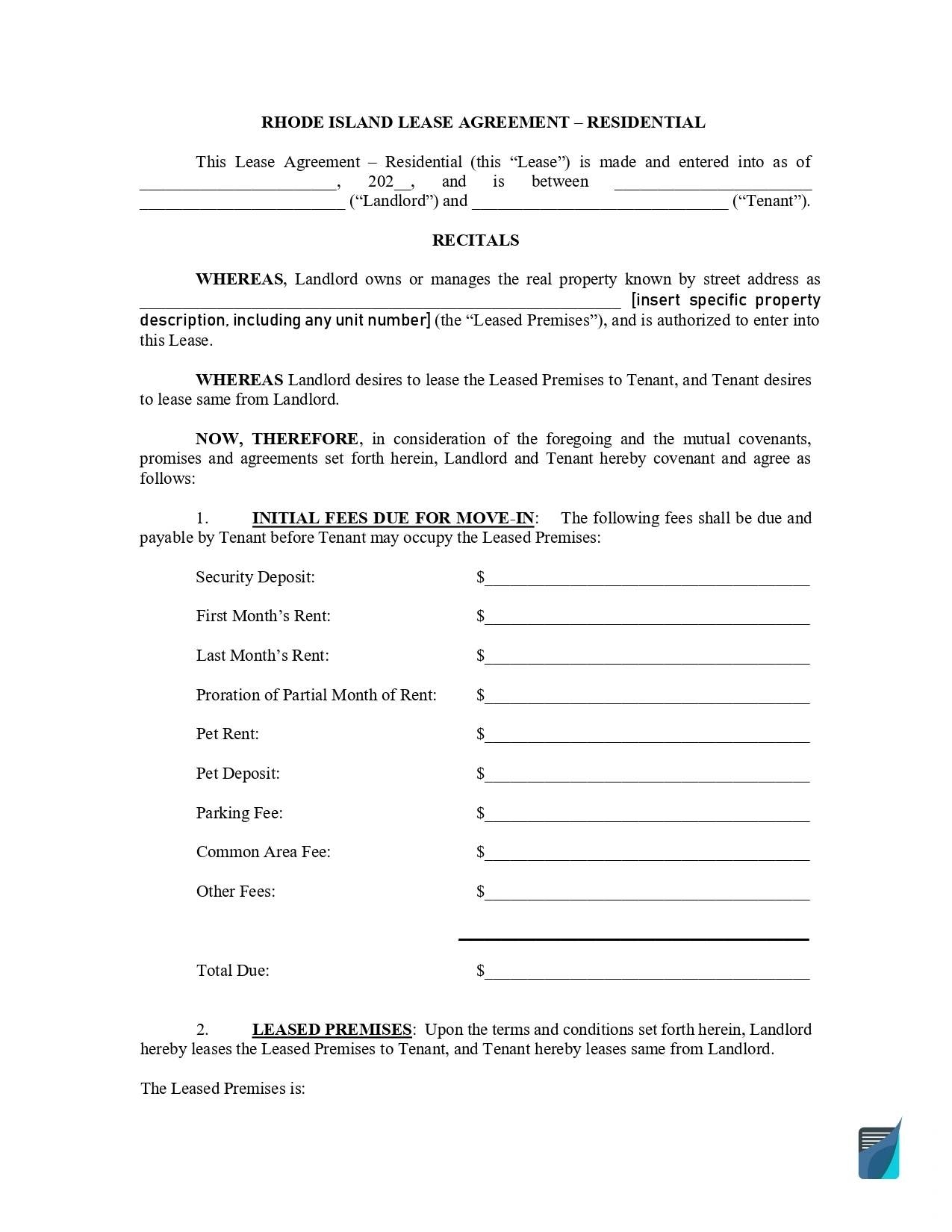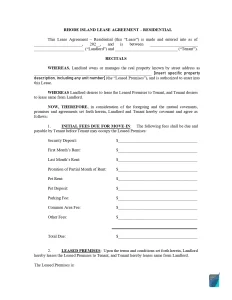Rhode Island Rental Lease Agreement Forms
The Rhode Island rental lease agreement form is a document landlords and tenants use to formalize the rental arrangement of a property. This contract specifies the terms under which the tenant is allowed to occupy the property, including the lease duration, the rent amount, and any other conditions both parties have agreed upon.
The Rhode Island lease agreement helps protect both the landlord and the tenant. It clearly outlines each party’s duties, including who takes care of the property, who pays for utilities, and how to handle any disagreements. The rental agreement template also covers details about the security deposit, rules about pets, and how either side can end the lease. This makes everything clear from the start, helping to avoid conflicts later.

Build Your Document
Answer a few simple questions to make your document in minutes
Save and Print
Save progress and finish on any device, download and print anytime
Sign and Use
Your valid, lawyer-approved document is ready
Rhode Island Laws and Lease Requirements
Chapter 34-18 of the Rhode Island General Laws contains all the legal rules and guidelines governing landlord-tenant interactions.
Security Deposits
Under Rhode Island law, particularly Section 34-18-19, the maximum security deposit a landlord can require from a tenant is one month’s rent. This deposit acts as a financial safeguard for the landlord, intended to cover potential rent defaults or damages to the property over normal wear and tear.
When the tenancy ends, the landlord must return the security deposit to the tenant within twenty days. This can occur after the lease has terminated, the landlord has regained possession of the property, or the tenant has provided a forwarding address. If costs are incurred for cleaning, disposing of left items, or repairs due to damage exceeding normal use, the landlord must provide the tenant with a detailed list of deductions. Furthermore, any outstanding rent can be subtracted from the security deposit before it returns.
Landlord’s Right to Entrys
Rhode Island law, specifically under Section 34-18-26, outlines the conditions under which a landlord may enter a rented dwelling. The statute protects tenants’ privacy while landlords can maintain and manage their property.
- Tenants are required not to deny landlords entry for several important reasons:
- To inspect the property,
- To carry out necessary or agreed repairs,
- To make improvements or alterations,
- To provide agreed services,
- Or to show the property to potential or actual buyers, tenants, or workers.
However, the landlord’s right to access the property comes with stipulations to prevent misuse. Landlords may enter a tenant’s dwelling without prior consent only in emergencies or if the tenant has been away for more than seven days and entry is deemed necessary to protect the property. In all other cases, except in emergencies, landlords must provide at least two days’ notice before entering and are restricted to visiting only during reasonable hours to minimize disruption to the tenant.
Needed Disclosures
Landlords in Rhode Island are required to make several disclosures to tenants:
- Tenants must be informed in writing about the identity and address of the property’s owner before or at the signing of the lease. If managing agents are involved, their details must also be disclosed (Section 34-18-20).
- For properties built on or before 1978, landlords must provide tenants with specific information concerning the risks associated with lead-based paint. It includes an informational packet detailing the potential health risks and a disclosure form that the tenant must sign.
- If the rental property is found to be in violation of housing codes, the landlord must notify the tenant within thirty days of the citation. However, no notification is necessary if the landlord resolves the issue within this period (Section 34-18-22.1).
The purpose of these disclosures is to protect renters and establish a transparent and just system for landlords.
Rhode Island Rental Lease Agreement Form Details
| Document Name | Rhode Island Rental Lease Agreement Form |
| Other Names | RI Rental Lease, Rhode Island Residential Lease Agreement |
| Relevant Laws | Rhode Island General Laws, Chapter 34-18 |
| Security Deposit Amount | One (1) month’s rent |
| Security Deposit Return | Twenty (20) days |
| Avg. Time to Fill Out | 18 minutes |
| # of Fillable Fields | 119 |
| Available Formats | Adobe PDF |


We provide a wide range of important Rhode Island documents to anyone in quest of convenience when handling various agreements, contracts, and other paperwork in the state.